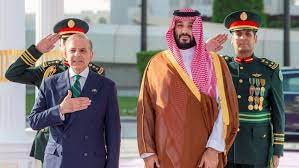Pakistan Defence Minister Khawaja Asif has confirmed that Saudi Arabia will stand by Pakistan if war breaks out with India. Speaking to local media, Asif emphasized that the newly signed Pakistan-Saudi mutual defence pact is modeled on NATO’s collective defence principle.
Saudi Arabia-Pakistan Defence Agreement
The agreement, signed during Prime Minister Shehbaz Sharif’s visit to Riyadh, includes a mutual defence clause stating that “any aggression against either country shall be considered aggression against both.”
“Yes, absolutely. There is no doubt about it,” Asif told Geo TV, confirming that Saudi Arabia would militarily support Pakistan in case of an Indian attack.
He further clarified that the pact is defensive, not offensive, and will only be activated if either Pakistan or Saudi Arabia faces aggression.
Pakistan’s Nuclear Capability and Saudi Arabia
When asked about nuclear support, Asif said Pakistan’s nuclear capabilities would be available under this agreement. Pakistan’s nuclear stockpile is estimated at 100–120 warheads, historically reserved for potential conflict with India.
“Our capabilities will absolutely be available under this pact,” he told Reuters.
A senior Saudi official also confirmed to Reuters that this is a “comprehensive defensive agreement encompassing all military means”, sparking global attention on the possibility of Saudi Arabia gaining access to a nuclear shield.
India’s Reaction to the Pact
The Indian government responded cautiously, stating that the pact formalizes a long-standing arrangement between Pakistan and Saudi Arabia. Officials in New Delhi said the implications are being reviewed but refrained from escalating rhetoric.
Global and Regional Impact
Analysts suggest the deal represents a strategic win for both nations:
-
Pakistan secures financial and political backing from Riyadh.
-
Saudi Arabia gains access to a potential nuclear deterrent.
-
Israel and Iran are expected to closely monitor the development.
Experts describe it as a marriage of “Riyadh’s wealth with Islamabad’s nuclear arsenal.”
Possibility of a Wider Arab Alliance
When asked about expanding the agreement into a larger Arab defence alliance, Asif hinted at the possibility:
“The doors are not closed… It is the fundamental right of Muslim nations to defend their region together.”
This raises speculation about a future Arab military bloc with Pakistan at its strategic core.
Key Takeaways
-
Pakistan-Saudi pact ensures mutual defence against external aggression.
-
Nuclear shield possibility raises global concerns, especially in West Asia.
-
India reviews deal’s implications while maintaining cautious diplomacy.
-
Analysts call it a historic partnership combining Saudi resources and Pakistan’s arsenal.















